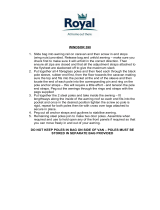Page is loading ...

4
DUKA-SUN-AIR-UM-1020
OPTIONAL
SIDE WALL
13
16
15
17
E
G
E
F
F
E
E
F
14
18
G

5
EN
DUKA-SUN-AIR-UM-1020
Thank you for purchasing your Dometic awning. Please read these instructions carefully before
attempting set up and retain for future reference. If used properly, your awning should give you years of
trouble free use. We recommend that your awning is insured against accidental and storm damage as
this is not covered by the warranty.
IMPORTANT - PLEASE READ:
Fabrics can be weakened by prolonged exposure to sunlight. Under normal
holiday use your awning will give long service but use for extended periods in
strong sunlight will soon cause deterioration. In those cases it would be wise
to use a site as shaded as possible. UV degradation is not covered under the
warranty. The warranty does not cover products on permanent sites, displays
or for commercial purposes.
The awning material has a waterproof PU coating over its entire surface (except All-Season) and
the main seams of your awning have been factory taped to help prevent leakage. Depending
upon your expectations, it may be necessary to treat the remaining seams with a seam sealant.
Seams treated with seam sealant cannot leak. Seam sealant should also be applied to areas
where the taping is damaged or has peeled away through wear and tear. It can also be applied
to areas where a leak may have developed. Dometic seam sealant is available from your dealer.
The awning keder beading is sewn to the awning with a special waterproof sewing thread. This
thread swells when wet to fill the needle holes but the thread needs to become wet several times
before it is totally effective. This process is known as ‘weathering’ and it may take several soakings
for the weathering to be fully effective. This area can also be treated with seam sealant.
Slide the awning keder beading, on the rear of the awning roof (see Diagram 1), through the caravan
awning channel until it is in your required position. The awning should be positioned on a horizontal part of
the caravan (see Diagram 2).
Locate the deflation valves at the bottom of each of the AirPoles (3). Ensure that the deflation valves are
closed by turning the tap clockwise 90° (see Diagram 3).
Locate the inflation valve on the awning (4). Unscrew the top cap and attach the pump nozzle (5). Start to
pump (6).
Once the awning has a good amount of air in it, pull the front of the awning outwards so that the AirPoles
can assume their correct shape (7).
Pegging Point A: Peg the corners of the awning (8a). Each corner should be pegged vertically in-line with the
top of the canopy, at an equal distance away from the caravan and in-line with each other.
Pegging point B: Loosen the quick pitch straps and peg them out diagonally from the corners (9b). Tighten
the quick pitch straps once in position(10b).
Clip the storm straps into place (11c) and hook the pegging “O” ring onto the bottom of the strap (12d) and
peg down using the provided steel peg.
Set-Up
Welcome
Your awning is designed for use in light to moderate weather. During very strong winds
or snowfall we recommend that you take your awning down. The awning is designed
for touring use; it is not designed for seasonal pitch or commercial use.
We recommend a trial run before using your awning for the first time. This will allow
you to familiarise yourself with the awning, its set up and any limitations the awning may
have for your particular use.

6
EN
DUKA-SUN-AIR-UM-1020
Attach the AccessoryTrack awning bracket to the AccessoryTrack placement located in the inside corners of
your sunshine awning (13e).
Clip the hooks at the top of the side wall fabric to the long pole (14).
Place the hooked end of the pole into the AccessoryTrack awning bracket (15e) then push the open end of
the pole onto the connection point inside the front corner of the awning (16f).
Use the locking mechanism (17) once in place to stabilise the pole and help keep side walls taut.
Attach the ladder pegging straps to the anchor points located at the bottom of the side walls, then start by
pegging the rear pegging points of the side wall (18g) slightly underneath your caravan.
Continue pegging the remaining pegging points of the side wall.
Keep pumping until the ideal inflation pressure of 9 psi (0.62 BAR) is achieved. If necessary take a rest
before adding more pressure.
Optional Side Wall Set-Up

YOUR LOCAL
SALES OFFICE
dometic.com/sales-offices
YOUR LOCAL
DEALER
dometic.com/dealer
YOUR LOCAL
SUPPORT
dometic.com/contact
dometic.com
A complete list of Dometic companies, which comprise the Dometic Group, can be found in the public filings of:
DOMETIC GROUP AB Hemvärnsgatan 15 SE-17154 Solna Sweden
/
